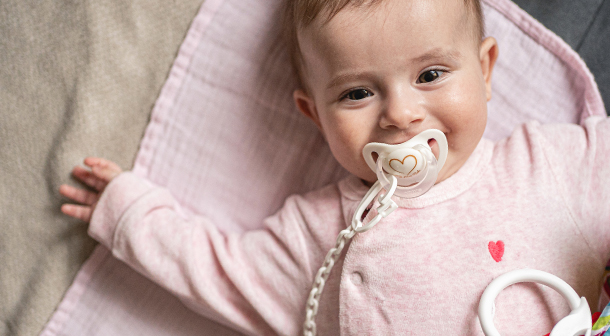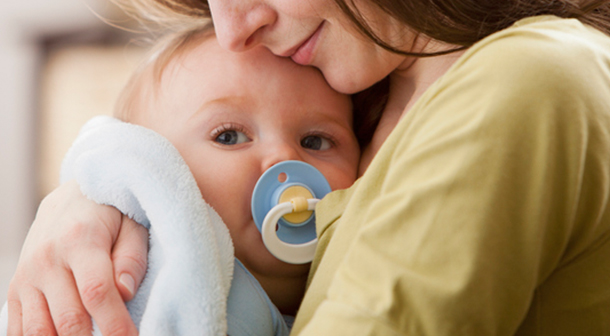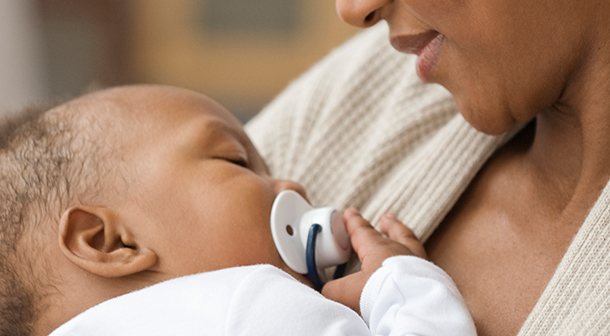Pacifier for Babies That Normally Don't Like Them
Dos and Don'ts for Pacifiers
Past GetParentingTips.com staff
Read Time: 7 Minutes
Is it safe to utilise a babe pacifier?
"Which are the best pacifiers for newborns?"
"What's the best pacifier for a breastfed baby?"
"How do I keep a pacifier in baby'southward mouth?"
Most new parents take a lot of questions about pacifiers, and information technology's no wonder - a 2017 study reported that most 85% of babies utilise a pacifier at least some of the fourth dimension!
Babies are born with a natural instinct to suck, and many babies find sucking on a pacifier (or their fingers or thumb) to be very soothing. In this article, we'll share some helpful pacifier facts and information so you can make informed decisions near when and if to offer a pacifier to your baby.
For being then minor, pacifiers raise a lot of big questions.
Pacifier prophylactic is an important starting point, but at that place is more to consider virtually giving your baby a pacifier.
Do pacifiers interfere with breastfeeding?
Many doctors and lactation consultants recommend not introducing pacifiers to newborns. Early and frequent sucking helps to build up the female parent's milk supply and establish good breastfeeding patterns.
The American University of Pediatrics (AAP) recommends that baby pacifiers be introduced afterwards breastfeeding is well established, ordinarily around 3 or four weeks of age. Waiting on offering a pacifier helps new parents spot their baby's early on hunger cues such as lip smacking, sucking on hands, and making sucking motions. Information technology too prevents newborns from developing "nipple confusion" or "nipple preference" when they switch between a pacifier and the chest.
Several studies have looked at the relationship between baby pacifiers and early weaning from breastfeeding. And the jury is nevertheless out. Many stopped short of maxim that pacifiers cause babies to wean earlier, but they did find that using a pacifier may be a sign of breastfeeding difficulties or reduce motivation to breastfeed. Yet, other research suggests that early pacifier utilize does not create breastfeeding difficulties or crusade early weaning in full-term babies whose mothers are motivated to breastfeed. The bottom line is that you have to practise what is right for you lot and your baby. Be sure to talk to your child's pediatrician about whatsoever concerns.
Exercise baby pacifiers cause ear infections?
Information technology'south unclear, but maybe. Studies have institute that pacifiers may cause problem with babies' inner ear tubes. Other studies have institute that breastfeeding protects babies against ear infections. Ear infections are well-nigh common between the ages of 6 months and iii years. If your child is prone to ear infections, you should consider limiting or discontinuing the use of a baby pacifier. Once again, exist certain to talk to your child'southward pediatrician and brand sure you keep rails of when your kid has an ear infection.
Do baby pacifiers carry a lot of germs?
Pacifiers can carry germs, so exist sure to launder your infant's pacifier oft. If your baby is sick yous should clean all of her (or his) pacifiers with hot, soapy water or sterilize them before each utilise. Pacifiers should be cleaned every time they fall on the floor or ground and should never be shared. Don't be tempted to put the pacifier in your own oral fissure to clean it - that's a sure style to transfer germs between you and your baby.
Do baby pacifiers prevent SIDS?
Putting your baby to slumber with a pacifier may aid prevent Sudden Infant Decease Syndrome (SIDS), though researchers aren't sure why. Doctors suspect that babies may sleep lighter while sucking on a pacifier and curl less during their sleep. To protect confronting sleep-related death, pacifiers should be used in conjunction with other safe slumber practices, including putting your baby to sleep alone, on her back in her crib, with no pillows, blankets, bumpers, or blimp animals. Information technology's okay if the baby pacifier falls out while she sleeps. If your baby wakes up fussy, yous tin offer her the pacifier, but you should never try to put a pacifier back in a sleeping infant'south oral cavity.
Are pacifiers bad for my baby'south teeth?
Yes - somewhen. Thumb sucking and pacifiers can crusade teeth to become kleptomaniacal and really modify the shape of your child's mouth. The American Dental Association (ADA) says it's all-time to go rid of pacifiers past the time your child is 4 years old, if not sooner. This volition aid your child's teeth and jaw muscles develop normally.
The ADA recommends pacifiers over thumb sucking considering it is easier for parents to discontinue their use when the time comes. However, the ADA likewise cautions parents against cleaning infant pacifiers by putting them in your own mouth because that tin can transfer crenel-causing germs to your kid. Tooth decay can brainstorm as soon every bit the baby'due south first teeth come in, unremarkably effectually half dozen months.
![]()
If your baby chews on her pacifier, throw it away. Chewing could cause tiny pieces to break off and create a choking hazard. Chewing on the pacifier instead of sucking on it may be a sign your baby is ready to wean off of pacifiers.
How do I keep the pacifier in my baby's mouth?
Follow your baby's lead on this one. Pacifiers should be a babe-led comfort device - they're only useful if the baby wants them. If your infant spits out the pacifier or turns her head when you offer the pacifier, she is done with the pacifier for now. You lot can offer it again after, but never force a pacifier into a infant's mouth.
![]()
Some babies simply don't similar pacifiers, so pay attention to your kid's response.

Baby Pacifier Dos and Don'ts
Every family unit has to brand their ain conclusion almost whether or non to offer pacifiers. If you exercise decide to give your child a pacifier, make sure you lot follow these tips.
DO:
- Wait until your baby has gotten the hang of breastfeeding before introducing a pacifier because the sucking mechanism for each is different. If you kickoff with a pacifier besides soon, there'due south a gamble information technology could interfere with successful breastfeeding.
- Try other means of soothing your baby before offer a pacifier, like cuddling, rocking, or singing. If you utilise a pacifier immediately, you lot may miss the underlying reason for why your baby is fussy. Maybe she has a tummy anguish, needs a diaper modify, or is hungry or sleepy.
- Make certain the pacifier is make clean and dry. If a pacifier falls on the ground, rinse it with hot soapy h2o.
DON'T:
- Force a pacifier into a babe'due south mouth or put it back in if it falls out when the infant is asleep.
- Allow siblings to share pacifiers or clean pacifiers by putting them in your ain oral fissure. This tin transfer germs that cause tooth decay or affliction.
- Coat the pacifier in carbohydrate or honey. This can atomic number 82 to tooth decay. Plus, giving honey to a kid under one yr of historic period can crusade a serious affliction called botulism.
- Use clips or zipper cords designed for pacifiers when your baby is asleep. They could get wrapped effectually a baby's neck.
- Attach a pacifier to your baby's crib, playpen, stroller or around your baby'due south neck or wrist with a ribbon, cord or cord. Babies can be strangled this way. Clips and attachment cords designed for pacifier use are ok to employ just when your baby is awake and you are watching her.
- Use the baby pacifier in any fashion that is reverse to the manufacturer's safe recommendations.
- Use a pacifier as a substitute for attending or other kinds of comfort such equally soothing, cuddling, rocking, or singing.

But wait, which baby pacifier is best?
Choosing a pacifier is kind of like choosing underwear - information technology'south personal. In that location isn't i pacifier that'due south best for infants, no matter what the pacifier companies try to tell y'all. You'll probably have to attempt several kinds to come across which pacifier your child prefers! Here are some things to consider:
- Size: Many manufacturers make pacifiers in unlike sizes. There are smaller pacifiers for newborns and larger ones for older children.
- Shape: Pacifiers come up in many shapes. Some have flat tips to mimic the shape of the nipple. Others hope to be "orthodontic" to assist go on babies' jaws in the correct position as they suck.
- Textile: Latex and silicone are two mutual materials. Nosotros recommend choosing a silicone pacifier as they tend to exist sturdier and are pinnacle-rack-dishwasher-safe. In addition, some babies, but like adults, tin be sensitive or allergic to latex.
![]()
When you do find that special pacifier that your baby likes best, buy several of them. Pacifiers have a way of getting lost and falling on the ground, so having a backup supply will keep you prepared.
hernandezpaind1973.blogspot.com
Source: https://www.getparentingtips.com/babies/development/dos-and-donts-for-pacifiers/default.asp
0 Response to "Pacifier for Babies That Normally Don't Like Them"
Post a Comment